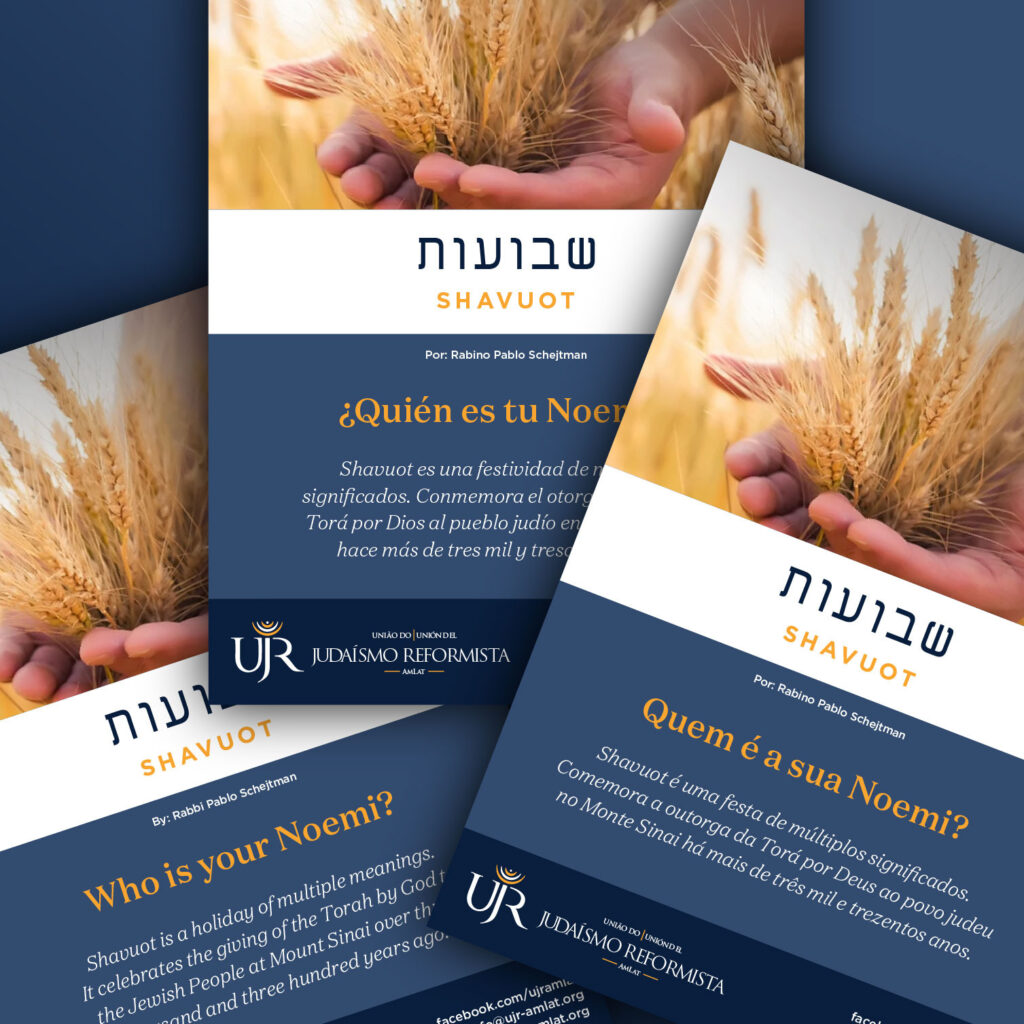Shavuot
שבועות
25-27 May 2023
6-7 Sivan 5783
Who is your Noemi?
Rabino Pablo Schejtman
União Israelita de Porto Alegre – Brasil
Shavuot is a holiday of multiple meanings. It celebrates the giving of the Torah by God to the Jewish People at Mount Sinai over three thousand and three hundred years ago. In this specific day we renovate our acceptance of the Law as we reaffirm our commitment to the interpretation and observance of the commandments. Before Shavuot, during the 49 days of the counting of the Omer, we had already been preparing ourselves spiritually through practices of introspection, spiritual growth and personal betterment. Now we are gifted with an unique opportunity to reflect on our relationship with the divine and strengthen the connection to sacred, elevated texts, which consititute a source of orientation for generations.
The celebration is impregnated with rituals and traditions. We light candles, study Torah all night, read the Ten Commandments in synagogue and enjoy dairy foods which symbolise sweetness and abundance. These practices intend to submerge us in the essence of the festivity and to connect us to the heritage and legacy delivered at Sinai. In fact, in Shavuot we have the opportunity to remember that it isn’t simply about revering and ancient book but about using it as orientation for a fulfilling existence. The study of Torah agitates the monotony of daily life. Its attentive reading allows us to rediscover the essential human conflicts and the fundamental divine unity that impregnates all creation. It incites us to recognise that our actions often generate peace and harmony in the world, converting it into a transcendental place. In summation, Shavuot presents us with an opportunity to strengthen our connection to the Torah, renovate our commitment to Jewish Values and celebrate the rich heritage that unites us.
In this publication the purposes are equally transcendental, yet more modest. Here we intend to extol the figure of Noemi, central character in Megillat Rut, the text read in this time. Such narrative is opportunistic for several reasons. First, Shavuot celebrates the delivery of the Torah and the acceptance of the People of Israel to fulfill and follow its teachings. And Megillat Rut is an account that highlights the aspiration to belong and to adhere to the beliefs of the Jewish people from a foreign woman, coming from Moab. At the same time, the story illustrates her commitment and loyalty towards her mother in law, Noemi. Afterwards, the development of the family plot – and its noble descendancy, king David – become an example of how individual actions can reach an historical impact. Another reason we read Megillat Rut in Shavuot is the story passes during the harvest of grain, precisely when we celebrate this holiday. This reminds us of the importance to express gratitude for the fruits of the earth and the blessing of natural abundance. Thus it invites us to foster similar human qualities: generosity, compassion, goodness as constant gestures.
The gestures of Noemi, Rut’s mother in law, which we find in the four chapters that make up the text, are decisive. In the beginning, Noemi is portrayed as an economic migrant living in the fields of Moab with her spouse and two male offspring, who marry local women.
Unfortunately, the family’s father passes, and not long afterwards the two young women become widows. In this moment, Noemi decides to return to Bethlehem, her native town. She then frees her daughters-in-law to reestablish their lives far from her, seeking other spouses and forming new families. Nevertheless Rut, resisting her mother-in-law’s insistence, chooses to stay at her side, connected to her destiny. Noemi’s choosing by Rut implicates on the adoption of a personal model of culture and religion, that is not connected to the God and people of her father-in-law, nor her husband’s, nor to the patriarchs’, but to Noemi’s: “Your people shall be my people, and your God, my God” (Rut 1:16).
Once in Bethlehem, she finds her restoration and redemption through her daughter-in-law’s luck, who married Boaz, a protective landowner relative. Furthermore, her grandson Obed brings life after successive losses, confirming thus a Jewish genealogical line that hasn’t ceased, but enriched at the end.
Daringly, and due to her centrality, it wouldn’t be unfair to propose we call this book ‘Megillat Noemi’. And to ask: Who is your Noemi?
Chag Shavuot Sameach.





